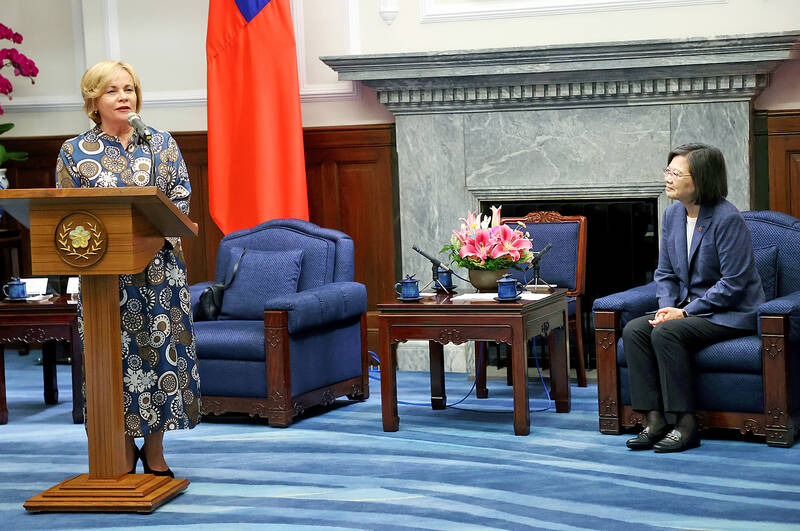The Ministry of Foreign Affairs yesterday thanked the UK and Sweden for jointly reaffirming the importance of peace and stability across the Taiwan Strait, and responding to China’s challenge.
The remarks came two days after British Prime Minister Rishi Sunak and Swedish Prime Minister Ulf Kristersson met in London to discuss foreign policy, including China issues.
“We will protect national security, cooperate with partners and engage with China where it is consistent with our national interests and security,” the prime ministers were quoted as saying in a British government statement.

Photo: CNA
In Taipei, the ministry said in a news release that it “acknowledges and welcomes” the expression of support from Taiwan’s democratic partners in handling the security threat posed by China.
The leaders of the UK and Sweden once again upheld the importance of peace in the Taiwan Strait in a display of concern for the situation in the region, it said, adding that Taiwan is committed to deepening cooperation with the two European states.
Taiwan stands at the front line in defense of freedom and democracy, and is resolved to strengthen democratic resilience and solidarity among democracies to facilitate a peaceful and prosperous future, the ministry said.
Sunak expressed concern about tensions between Taiwan and China at the Franco-British summit in March and during a meeting with Italian Prime Minister Giorgia Meloni, the ministry said.
Kristersson at the Stockholm China Forum last month warned that a rise in cross-strait tensions would jeopardize the safety of Taiwanese, the West’s regional partners and Europe, it added.
Meanwhile, President Tsai Ing-wen (蔡英文) yesterday said that Taiwan’s collaboration with the EU was important for global security.
“Taiwan and the European Union are important partners that share such values as democracy, freedom and human rights,” Tsai said at a reception for the first delegation from the EU to visit Taiwan this year.
She thanked the EU for “passing a number of resolutions in recent years that have focused on Taiwan Strait’s security issues.”
Separately, a poll released yesterday in Australia showed that respondents would back imposing sanctions on Beijing and sending arms to aid Taiwan were China to attack, but not deploying troops.
In the annual survey conducted by the Lowy Institute, 82 percent of respondents supported the nation’s security alliance with the US, although 75 percent believed that the alliance would draw Australia into a conflict in Asia.
Eighty percent said they would support “accepting Taiwanese refugees into Australia,” 76 percent backed economic and diplomatic sanctions on China, 64 percent supported sending arms and military supplies to Taiwan and 61 percent would support “using the Australian Navy to help prevent China from imposing a blockade around Taiwan,” the Lowy Institute said in a report.
However, only 42 percent backed sending Australian military personnel to Taiwan, it said.
Additional reporting by Reuters

CALL FOR SUPPORT: President William Lai called on lawmakers across party lines to ensure the livelihood of Taiwanese and that national security is protected President William Lai (賴清德) yesterday called for bipartisan support for Taiwan’s investment in self-defense capabilities at the christening and launch of two coast guard vessels at CSBC Corp, Taiwan’s (台灣國際造船) shipyard in Kaohsiung. The Taipei (台北) is the fourth and final ship of the Chiayi-class offshore patrol vessels, and the Siraya (西拉雅) is the Coast Guard Administration’s (CGA) first-ever ocean patrol vessel, the government said. The Taipei is the fourth and final ship of the Chiayi-class offshore patrol vessels with a displacement of about 4,000 tonnes, Lai said. This ship class was ordered as a result of former president Tsai Ing-wen’s (蔡英文) 2018

UKRAINE, NVIDIA: The US leader said the subject of Russia’s war had come up ‘very strongly,’ while Jenson Huang was hoping that the conversation was good Chinese President Xi Jinping (習近平) and US President Donald Trump had differing takes following their meeting in Busan, South Korea, yesterday. Xi said that the two sides should complete follow-up work as soon as possible to deliver tangible results that would provide “peace of mind” to China, the US and the rest of the world, while Trump hailed the “great success” of the talks. The two discussed trade, including a deal to reduce tariffs slapped on China for its role in the fentanyl trade, as well as cooperation in ending the war in Ukraine, among other issues, but they did not mention

HOTEL HIRING: An official said that hoteliers could begin hiring migrant workers next year, but must adhere to a rule requiring a NT$2,000 salary hike for Taiwanese The government is to allow the hospitality industry to recruit mid-level migrant workers for housekeeping and three other lines of work after the Executive Yuan yesterday approved a proposal by the Ministry of Labor. A shortage of workers at hotels and accommodation facilities was discussed at a meeting of the legislature’s Transportation Committee. A 2023 survey conducted by the Tourism Administration found that Taiwan’s lodging industry was short of about 6,600 housekeeping and cleaning workers, the agency said in a report to the committee. The shortage of workers in the industry is being studied, the report said. Hotel and Lodging Division Deputy Director Cheng

‘SECRETS’: While saying China would not attack during his presidency, Donald Trump declined to say how Washington would respond if Beijing were to take military action US President Donald Trump said that China would not take military action against Taiwan while he is president, as the Chinese leaders “know the consequences.” Trump made the statement during an interview on CBS’ 60 Minutes program that aired on Sunday, a few days after his meeting with Chinese President Xi Jinping (習近平) in South Korea. “He [Xi] has openly said, and his people have openly said at meetings, ‘we would never do anything while President Trump is president,’ because they know the consequences,” Trump said in the interview. However, he repeatedly declined to say exactly how Washington would respond in